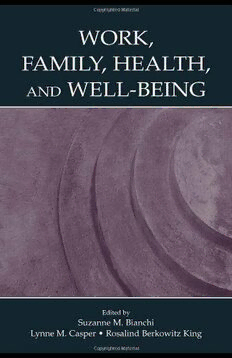
Work, Family, Health, and Well-being PDF
600 Pages·2005·30.178 MB·English
Most books are stored in the elastic cloud where traffic is expensive. For this reason, we have a limit on daily download.
Preview Work, Family, Health, and Well-being
Description:
Work, Family, Health, and Well-Being grew out of a conference held in Washington, D.C. in June 2003 on "Workforce/Workplace Mismatch: Work, Family, Health, and Well-Being" sponsored by the National Institute of Health (NIH). The text considers multiple dimensions of health and well-being for workers and their families, children, and communities. The health of the individual worker is likely intimately related to the health of the worker's family. Investigations into the socioeconomic gradient in health within broad occupational categories have raised important questions about the role of specific working conditions versus the role of conditions of employment such as wages and level of job security afforded a worker and his/her family in affecting health outcomes. Organized into seven parts, this text: *provides an overview of changes in work and family time and time use; *dedicates a section focusing specifically on employers and workplaces; *explores disciplinary perspectives on work, family, health, and well-being; *focuses on the most studied work and family nexus, the interrelationship between parental employment, especially maternal employment and the child's well-being; *examines gender differences in the division of labor, the effect of marriage on health, the shifting nature of care-giving throughout life, and the role of work on various health and well-being outcomes; *explores occupational health literature; and *focuses on the unique work-family issues faced by low-income families and workers in low-wage jobs. This book appeals to anyone in the fields of psychology, sociology, family studies, demographics, economics, anthropology, and social work.
See more
The list of books you might like
Most books are stored in the elastic cloud where traffic is expensive. For this reason, we have a limit on daily download.
